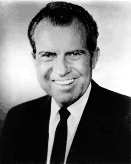Presidential Scandals
Updated February 21, 2017 | Factmonster Staff 

Richard Nixon: Watergate

The scandal that ended the Nixon presidency began on June 17, 1972, when five men, all employees of Nixon's reelection campaign, were caught breaking into rival Democratic headquarters at the Watergate complex in Washington, DC. The intruders and two other accomplices were convicted of burglary and wiretapping in Jan. 1973; but it soon became evident, from hints that emerged at the trial and other details revealed in a series of articles by the Washington Post, that the break-in had had the approval of higher-level government officials who were attempting to cover up their involvement.
In April 1973, with a Senate investigation underway, several top Nixon aides, including H. R. Haldeman and John D. Ehrlichman, resigned over the scandal, and White House counsel John Dean III was fired. Dean subsequently testified during televised hearings beginning in May, exposing Nixon's participation in the Watergate cover-up and massive illegalities in Republican fundraising in 1972.
The hearings also revealed that since 1971 Nixon had recorded conversations and telephone calls in his office. The president, however, refused to turn the tapes over to the Senate Watergate committee, citing executive privilege. In Oct. 1973 Nixon ordered Elliot Richardson, the attorney general, to fire Archibald Cox, the special prosecutor who had subpoenaed the tapes, but Richardson chose to resign instead. Richardson's assistant, William Ruckelshaus, also refused to fire Cox and was himself fired. Finally, it was the solicitor general, Robert Bork, who fired Cox. The incident, which became known as the "Saturday Night Massacre," led to widespread calls for Nixon's impeachment.
The White House released edited transcripts of the tapes in April 1974, and eventually the tapes themselves, after the Supreme Court rejected Nixon's claim to executive privilege. But the damage was done; President Nixon's behavior—his cover-up of the burglary and refusal to turn over evidence—and the erosion of the public's confidence in his administration, led the House Judiciary Committee to issue three articles of impeachment on July 30, 1974. The document also indicted Nixon for illegal wiretapping, misuse of the CIA, perjury, bribery, obstruction of justice, and other abuses of executive power.
"In all of this," the articles of impeachment summarize, "Richard M. Nixon has acted in a manner contrary to his trust as President and subversive of constitutional government, to the great prejudice of the cause of law and justice, and to the manifest injury of the people of the United States." Impeachment appeared inevitable, and Nixon resigned on Aug. 9, 1974.
Nixon was succeeded in office the same day by Vice President Gerald R. Ford, who a month later issued a full pardon to Nixon for any crimes he might have committed in office, thus eliminating the possibility of future prosecution. A number of other administration officials served time in prison for their offenses, including former attorney general John Mitchell, Haldeman, Ehrlichman, and Dean, and G. Gordon Liddy, a former FBI agent who helped plan the Watergate break-in.
In April 1973, with a Senate investigation underway, several top Nixon aides, including H. R. Haldeman and John D. Ehrlichman, resigned over the scandal, and White House counsel John Dean III was fired. Dean subsequently testified during televised hearings beginning in May, exposing Nixon's participation in the Watergate cover-up and massive illegalities in Republican fundraising in 1972.
The hearings also revealed that since 1971 Nixon had recorded conversations and telephone calls in his office. The president, however, refused to turn the tapes over to the Senate Watergate committee, citing executive privilege. In Oct. 1973 Nixon ordered Elliot Richardson, the attorney general, to fire Archibald Cox, the special prosecutor who had subpoenaed the tapes, but Richardson chose to resign instead. Richardson's assistant, William Ruckelshaus, also refused to fire Cox and was himself fired. Finally, it was the solicitor general, Robert Bork, who fired Cox. The incident, which became known as the "Saturday Night Massacre," led to widespread calls for Nixon's impeachment.
The White House released edited transcripts of the tapes in April 1974, and eventually the tapes themselves, after the Supreme Court rejected Nixon's claim to executive privilege. But the damage was done; President Nixon's behavior—his cover-up of the burglary and refusal to turn over evidence—and the erosion of the public's confidence in his administration, led the House Judiciary Committee to issue three articles of impeachment on July 30, 1974. The document also indicted Nixon for illegal wiretapping, misuse of the CIA, perjury, bribery, obstruction of justice, and other abuses of executive power.
"In all of this," the articles of impeachment summarize, "Richard M. Nixon has acted in a manner contrary to his trust as President and subversive of constitutional government, to the great prejudice of the cause of law and justice, and to the manifest injury of the people of the United States." Impeachment appeared inevitable, and Nixon resigned on Aug. 9, 1974.
Nixon was succeeded in office the same day by Vice President Gerald R. Ford, who a month later issued a full pardon to Nixon for any crimes he might have committed in office, thus eliminating the possibility of future prosecution. A number of other administration officials served time in prison for their offenses, including former attorney general John Mitchell, Haldeman, Ehrlichman, and Dean, and G. Gordon Liddy, a former FBI agent who helped plan the Watergate break-in.
See also:
